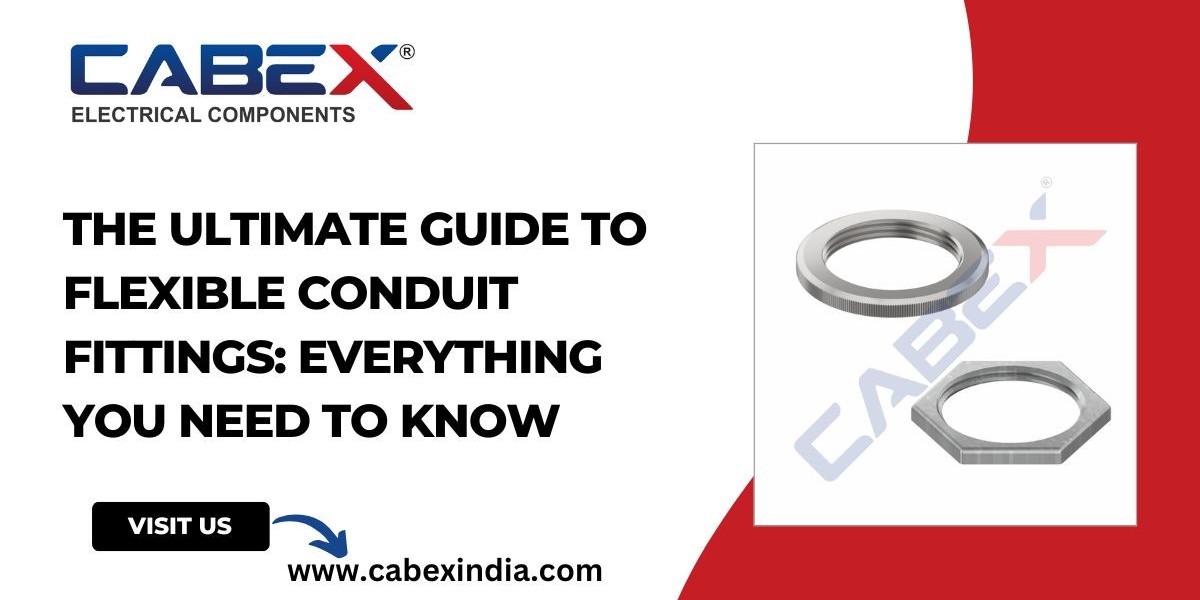Flexible Conduit Fittings are essential components in modern electrical systems, offering flexibility and durability to safeguard electrical cables and wiring. These fittings are designed to provide protection from physical damage, moisture, and environmental conditions while maintaining a secure and organized electrical setup. At Cabex India, we specialize in providing high-quality flexible conduit fittings that cater to various industrial and commercial applications. In this article, we delve deep into the importance of flexible conduit fittings, their types, and how they ensure the safety and longevity of your electrical systems.
What Are Flexible Conduit Fittings?
Flexible conduit fittings are connectors that allow you to attach flexible conduits to electrical panels, junction boxes, or other devices. These fittings are made of robust materials such as galvanized steel, stainless steel, and PVC, and they are engineered to provide a secure, sealed connection that keeps electrical wires safe from external elements. They play a pivotal role in protecting cables from mechanical damage, extreme temperatures, chemical exposure, and electrical hazards.
Flexible conduit fittings come in a variety of shapes and sizes, depending on the type of conduit and the application. Common types include elbow fittings, couplings, connectors, and adapters. Each of these components ensures that the conduit system is well-protected and functions efficiently.
The Role of Flexible Conduit Fittings in Electrical Systems
Flexible conduit fittings are not just accessories; they are integral to maintaining the integrity of electrical wiring in various environments. Here's why they are crucial:
1. Protection from Physical Damage
One of the primary functions of flexible conduit fittings is to protect electrical cables from physical harm. Electrical cables are vulnerable to abrasion, impacts, and pressure, especially in industrial settings. Flexible conduit fittings ensure that cables remain intact and safe from these threats, reducing the risk of electrical faults and short circuits.
2. Enhanced Safety in Hazardous Environments
In environments where electrical systems are exposed to chemicals, moisture, or extreme temperatures, flexible conduit fittings offer essential protection. With their tight seals and durable materials, these fittings prevent harmful substances from coming into contact with sensitive electrical cables, ensuring safe operation and reducing the risk of electrical accidents.
3. Easy Installation and Maintenance
Flexible conduit fittings are designed for ease of installation and flexibility. Whether you're working in tight spaces or need to reroute cables for maintenance, these fittings allow for easy adjustments without compromising the system's security. Their flexibility allows for easy routing around obstacles, reducing installation time and costs.
4. Durability and Longevity
Made from corrosion-resistant and robust materials, flexible conduit fittings are built to last. They provide long-term protection for electrical systems, ensuring that cables remain in good condition throughout their service life. Whether used in residential, commercial, or industrial applications, these fittings offer excellent resilience to harsh environments.
Types of Flexible Conduit Fittings
Flexible conduit fittings come in various forms, each serving specific purposes. Understanding these types helps in selecting the right fitting for your electrical system. Some of the most common types include:
1. Flexible Conduit Couplings
Flexible conduit couplings are used to join two sections of flexible conduit. These fittings are essential when extending the length of the conduit or when transitioning from one type of conduit to another. Metallic and non-metallic couplings are available, with metallic ones providing additional strength and protection against environmental factors.
2. Flexible Conduit Connectors
Flexible conduit connectors are used to secure the flexible conduit to electrical boxes, panels, or other enclosures. They ensure a tight, secure connection between the conduit and the enclosure, preventing the cables from being exposed to external elements. Connectors are available in various sizes to match the diameter of the conduit and the type of enclosure.
3. Elbow Fittings
Elbow fittings are used to change the direction of flexible conduit, allowing the system to navigate corners or obstacles. These fittings are available in various angles, typically 45 degrees or 90 degrees, to provide the necessary redirection of the conduit. Elbow fittings offer maximum protection at bends, ensuring that the cables inside remain secure and undamaged.
4. Flexible Conduit Adapters
Flexible conduit adapters are used to connect flexible conduits to rigid conduits or other electrical components. These fittings are crucial in environments where a mix of flexible and rigid conduit systems is needed. Adapters ensure a seamless transition between different conduit types, maintaining the integrity of the electrical system.
5. Strain Relief Fittings
Strain relief fittings are designed to prevent undue stress on cables and conduits, particularly at connection points. These fittings are essential for preventing damage from tension or pulling forces that could cause the conduit or cables to break or loosen over time. Strain relief fittings help maintain the longevity and safety of the electrical system.
Key Benefits of Using Flexible Conduit Fittings
1. Flexibility in Installation
Flexible conduit fittings allow for greater flexibility during the installation process. Whether you need to make quick adjustments or navigate complex layouts, these fittings offer an adaptable solution. Their flexible nature ensures that they can easily route through difficult spaces, making them perfect for installations in tight, hard-to-reach areas.
2. Weather and Corrosion Resistance
Flexible conduit fittings made from corrosion-resistant materials like stainless steel or galvanized steel are highly effective in outdoor applications or areas prone to moisture. These fittings maintain their durability even in extreme weather conditions, protecting electrical cables from rust and corrosion, which could otherwise lead to system failure.
3. Improved Aesthetic and Cleanliness
Flexible conduit fittings help in maintaining a clean and organized appearance for electrical systems. The neat and compact layout of the conduit system, secured with these fittings, ensures that cables are properly arranged, preventing tangling or damage. This contributes to a safer and more aesthetically pleasing environment.
4. Cost-Effective Solution
Compared to rigid conduit systems, flexible conduit fittings offer a more cost-effective solution. They are easier to install, require fewer components, and can be adjusted or rerouted without the need for extensive labor. This translates into lower installation and maintenance costs, making flexible conduit fittings an economical choice for various projects.
Choosing the Right Flexible Conduit Fittings for Your Needs
Selecting the appropriate flexible conduit fittings requires careful consideration of the specific requirements of your electrical system. Factors such as the environmental conditions, type of conduit, and electrical load all play a role in determining which fittings will provide the best protection and performance.
Here are a few tips to help you make the right choice:
- Assess the environmental conditions: If your system will be exposed to moisture, chemicals, or extreme temperatures, opt for corrosion-resistant and waterproof fittings.
- Consider the size of the conduit: Ensure that the fittings match the diameter and type of flexible conduit you are using to guarantee a secure fit.
- Evaluate the need for flexibility: In situations where you need to navigate around obstacles or make adjustments, choose fittings that offer maximum flexibility.
- Check for compliance with standards: Ensure that the fittings meet relevant industry standards and regulations for safety and performance.
Why Choose Cabex India for Your Flexible Conduit Fittings?
At Cabex India, we are committed to providing top-quality flexible conduit fittings that meet the highest industry standards. With years of experience in the field, we offer a wide range of flexible conduit fittings, including connectors, elbow fittings, couplings, and more. Our products are designed to offer superior protection and durability for your electrical systems, ensuring long-term performance and safety.
Key Features of Our Flexible Conduit Fittings
- High-quality materials: We use corrosion-resistant materials such as stainless steel and galvanized steel to ensure our fittings withstand harsh environments.
- Precision engineering: Our fittings are manufactured with precision, ensuring a perfect fit for every installation.
- Wide range of products: From flexible conduit connectors to elbow fittings and strain relief connectors, we provide a comprehensive selection to meet all your needs.
- Customization options: We understand that every project is unique. That's why we offer customized solutions to suit your specific requirements.
For more information, visit our website at Cabex India.









